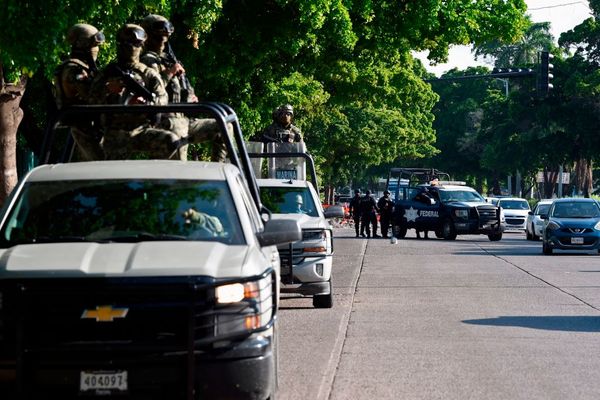
Nigel Farage could have strangled this story at birth. Confronted with the testimony of more than 20 former schoolmates, who shared with the Guardian their memories of a young Farage taunting Jews and other minorities in the most appalling terms – telling a Jewish pupil that “Hitler was right”, singing “Gas ’em all” and making a hissing sound to simulate lethal gas – he could have said: “I have no memory of what’s been described, but such behaviour would of course have been atrocious and if I was involved in any way, I am genuinely sorry.”
Sure, it would have been more of an “ifpology” than an apology, its admission of guilt wholly conditional, but it would surely have closed the story down. Reassured that the Reform UK leader had declared racist and antisemitic abuse unacceptable, most observers would have allowed that these events took place half a century ago and moved on.
But that is not what Farage did. Instead, he and his party have offered shifting accounts, moving from outright denial to non-denial denial and back again. That slipperiness itself raises questions about the character of the man who, according to the polls, is on course to be Britain’s next prime minister. But this episode also points to a larger and more alarming phenomenon, one that stretches far beyond these shores.
Farage’s defence rests on three pillars, each one of which is shaky. The first response has been to say the accusations are all untrue or, to put it another way, that his accusers are liars. As at least one of them has pointed out, that is itself an antisemitic trope: that Jews lie about their own suffering in pursuit of some devious, unstated end.
The second line of defence insists that Farage never did these things but, if he did, it would be irrelevant because he was only a child at the time. I’ve spoken to several Jewish community officials who say this is among the reasons why, so far, they have been reluctant to join the chorus of condemnation. True, the argument is undermined somewhat by the fact that Farage’s alleged conduct spanned a six-year period, right until he was a sixth former, aged 18, but it might just hold up – were it not for a flaw in Farage’s third defence.
This argues that the accusations against him lack force because they have no bearing on his politics today; that whatever the ex-pupils of Dulwich college might say about the boy of the 1970s and 1980s, the man of 2025 cannot be accused of antisemitism. Here the facts get a bit more awkward.
Consider one of Farage’s comments this week, in a broadcast interview where he gave that non-denial denial. “Have I said things 50 years ago that you could interpret as being banter in a playground, you could interpret in a modern light today in some sort of way? Yes.” Perhaps Farage was admitting there to less than his accusers recall, but it sounded as if he was suggesting that songs about gassing Jews, Asians and Black people amount to no more than “banter”. That’s not schoolboy Farage talking, but the Farage of 2025.
And that is far from the only mark against the fully adult politician. In 2017, the Board of Deputies of British Jews said he had “crossed the line into well-known antisemitic tropes”, after he had nodded along while a caller to his LBC show claimed that Israel had both the Republican and Democratic parties “in their pockets”. Farage replied: “In terms of money and influence they are a very powerful lobby”, explaining that “there are about six million Jewish people living in America, so as a percentage it’s quite small, but in terms of influence it’s quite big”.
Three years later, the Board of Deputies again denounced the then Brexit party leader for trading “in dog whistles and tropes”, after he had repeatedly deployed words and motifs that are staples of far-right antisemitic conspiracy theory.
In that period, Farage was ticking off almost every item on the trope bingo card, railing against “globalists”, “cultural Marxists”, Goldman Sachs and George Soros, the latter a perennial hate figure to those who allege a secret Jewish plot to undermine nation states in pursuit of global government. In a 2020 article for Newsweek, Farage aimed his fire at “unelected globalists shaping the public’s lives based on secret recommendations from the big banks”.
The Community Security Trust, or CST, the organisation that monitors and combats antisemitism in the UK, lambasted Farage at the time for using “language that evokes antisemitic conspiracy codewords”, warning that “this search for scapegoats will keep requiring new enemies and new excuses, moving the national debate into more polarising and dangerous places”.
There was particular disquiet at the company Farage was keeping, cheerfully sitting alongside the notorious Alex Jones of Infowars, for example, as the pair played some of the greatest hits of antisemitic conspiracy theory, from the Bilderberg group to “new world order”. Farage was no less happy to be interviewed at least six times by Rick Wiles, a far-right US pastor who would later brand the impeachment of Donald Trump a “Jew coup”.
Which brings us to that larger phenomenon. Talk to the CST today and it is clear that the most urgent, direct threat to Jewish safety is violent jihadism, of the kind that saw Jihad al-Shamie launch a deadly attack on Heaton Park synagogue in Manchester last month. But what it sees as a growing long-term danger is a shift now under way on the US right.
The fear, as CST policy director Dave Rich puts it, is that “Nick Fuentes becomes the face of the Republican movement” – Fuentes being the unabashed white supremacist and Holocaust denier who once dined with Trump at Mar-a-Lago and who, some warn, is poised to replace Charlie Kirk as the darling of the next Republican generation.
Dispensing with the previous posture in which rightwing politicians deflected accusations of antisemitism by boasting of their pro-Israel credentials – even if their support for Israel amounted to no more than taking sides in what they saw as a battle of the west against Islam – Fuentes, Tucker Carlson and others are moving into a new place. No longer speaking of “Judeo-Christian values”, but espousing instead an aggressive Christian nationalism, they are increasingly hostile to Israel and Zionism, and seemingly motivated not by sympathy for the Palestinians, but rather by an updated version of the 1930s, America First view that suspected a Jewish plot to drag America to war. Given the global might of the US, such a change to the American right would have a profound effect on Jews the world over.
All of which is a long way from the playground of Dulwich college. But perhaps it explains why Nigel Farage’s youth is not quite as irrelevant as he would have us believe. Because the past has a nasty habit of intruding into the present – and future.
Do you have an opinion on the issues raised in this article? If you would like to submit a response of up to 300 words by email to be considered for publication in our letters section, please click here.







